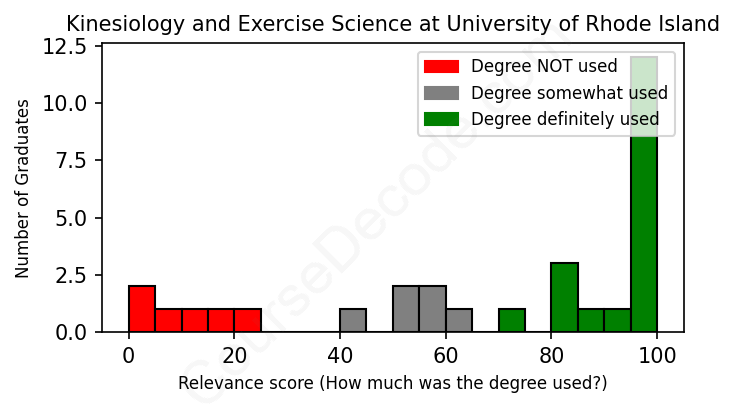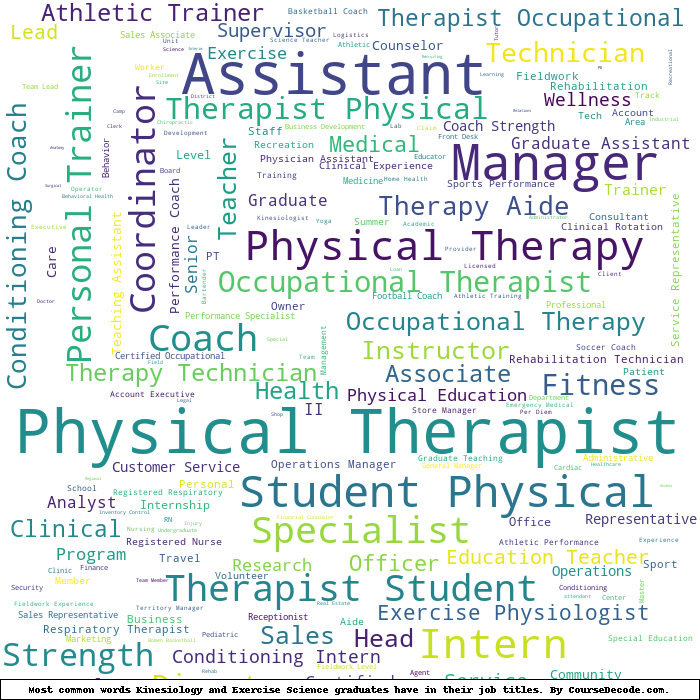
First, some facts. Of the Kinesiology and Exercise Science graduates from University of Rhode Island we've analyzed , here's how many have used (or NOT used) their degree in their career:

These are estimates based on AI analysis of 30 LinkedIn profiles (see below).
The verdict? Slightly above average. Overall, with an average relevance score of 69%, Kinesiology and Exercise Science graduates from University of Rhode Island have a slightly higher likelihood (+2%) of finding work in this field compared to the average graduate across all fields:
And for comparison, here's the chart for all profiles we've looked at across all degrees.
Also, after graduating, 56% of these graduates have pursued further education other than another Bachelor's degree (such as a Masters degree or other), compared to the average across all profiles of 35%. This suggests you may need more than just a Bachelors degree to be competitive as a Kinesiology and Exercise Science graduate.
See the details:
|
Relevance score: 52% We think this person has gone into a career only somewhat relevant to their degree. We think this person has gone into a career only somewhat relevant to their degree.
DEGREE INFOGraduated in 2013 from University of Rhode Island with a Bachelor of Science (BS) in Kinesiology and Exercise Science. No other secondary education since. JOB HISTORY SINCE GRADUATIONOT Intern URI Child Development Center Jan 2013 - Jun 2013 OT Intern  Peace Dale Elementary School Jan 2013 - Jun 2013 OT Intern  West Kingston Elementary School Jan 2013 - Jun 2013 Young Athletes Program  Special Olympics Rhode Island May 2013 - Present Direct Care Worker - Personal Supports Services for Children  Northeast Behavioral Associates Jan 2014 - Present ABOUTNo information provided. |
The top 10 most common jobs done by the graduates we've analyzed (ranked most common to least) are:
When looking at the career paths of graduates with a degree in Kinesiology and Exercise Science from the University of Rhode Island, it's clear that many have found their way into roles that highly align with their studies. Common jobs include positions like Physical Therapist, Strength and Conditioning Coach, and Rehabilitation Aide. These roles are directly related to the core concepts of Kinesiology, such as understanding human movement, exercising science principles, and rehabilitation techniques. For example, many graduates work as Physical Therapists or in strength and conditioning-focused roles, where they actively apply their training to help patients and athletes improve their physical health and performance.
However, not all jobs held by these graduates are completely relevant to their degree. Some have ventured into positions like administrative roles, sales, and other jobs that don’t directly utilize their Kinesiology knowledge. For instance, roles such as a Marketing Coordinator or Front Desk Clerk may only use peripheral skills acquired during their studies. Overall, while a good number of graduates are successfully applying their Kinesiology and Exercise Science knowledge in meaningful ways, there are also notable instances of graduates settling for positions unrelated to their field. This mix suggests a diverse pathway, with a significant portion aligning closely with Kinesiology principles while others drift into broader career options.
Here is a visual representation of the most common words in job titles for Kinesiology and Exercise Science graduates (this is across all Kinesiology and Exercise Science graduates we've analyzed, not just those who went to University of Rhode Island):

Graduates from the Kinesiology and Exercise Science program at the University of Rhode Island seem to be carving out a variety of career paths that largely align with their studies. When looking at their first jobs after graduation, many of these individuals start off in positions such as physical therapy aides, health and fitness coordinators, or personal trainers—positions that allow them to gain valuable hands-on experience in the health and wellness fields. For instance, a number of graduates took roles as rehabilitation aides or interns immediately after finishing their degrees, which is a common stepping stone for those aiming to enter physical therapy or exercise science specialties.
Fast forward five to ten years, and more established alumni often find themselves in more advanced roles such as physical therapists, strength and conditioning coaches, or wellness program managers. It’s clear that many have successfully transitioned into careers directly related to their degree, with a significant number even moving into management roles or specialized fields like sports medicine. However, it's also worth noting that some grads have veered off into unrelated fields or taken on roles that don’t fully utilize their kinesiology training, such as in project management or corporate roles. Overall, while there are varied pathways, many graduates appear to find fulfilling careers in health, fitness, and rehabilitation sectors that make good use of their education.
Honestly, a Bachelor’s degree in Kinesiology and Exercise Science at schools like the University of Rhode Island can be pretty manageable, especially if you're into sports and fitness stuff. You'll dive into topics like anatomy, exercise physiology, and even nutrition, which can be super interesting if you’ve got a passion for that field. The workload isn’t as intense as some other science majors, but you will still need to hit the books and show up for labs and practical sessions. It’s a balanced mix of theoretical knowledge and hands-on experience, making it easier for those who truly enjoy the subject. So, if you’re motivated and engaged, you should find it pretty doable!
Most commonly, in the LinkedIn profiles we've looked at, it takes people 4 years to finish a Bachelor degree in Kinesiology and Exercise Science.
From what I can see, the kinesiology and exercise science grads from the University of Rhode Island have had a pretty varied range of job titles, which can hint at their earnings. Some, like the Head of Strength and Conditioning and Physical Therapists, likely pull in decent salaries, especially if they stay in those roles for a while. Others, particularly those in teaching or entry-level positions, might not be making as much right off the bat. Overall, it looks like there’s a mix; some are definitely on a solid financial path, while a few might still be figuring things out. It’s all about how you climb the ladder in this field!
Here is a visual representation of the most common words seen in the "about" section of LinkedIn profiles who have a Bachelor degree in Kinesiology and Exercise Science (this is across all Kinesiology and Exercise Science graduates we've analyzed, not just those who went to University of Rhode Island). This may or may not be useful:

Here are all colleges offering a Bachelor degree in Kinesiology and Exercise Science (ordered by the average relevance score of their Kinesiology and Exercise Science graduates, best to worst) where we have analyzed at least 10 of their graduates: